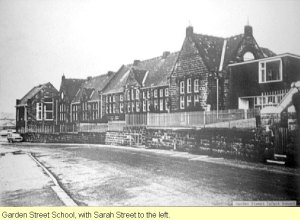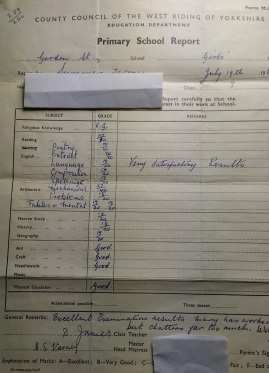This may not be a well written blog because I’m trying to write it quickly and I’m trying to put over an idea that I think is quite simple but others find more complicated.
It’s to do with access to Oxbridge and other forms of success and privilege and how many people still don’t understand how it works. I’ll illustrate this with my own story. It’s from quite a while ago – I took A levels in 1972 but I’ve taught in an inner city sixth form in the naughties so I do know that many of the issues still exist.
First, background.
I come from a working class community. My dad was a train driver (started as a cleaner, as you did back then, and worked his way up through fireman etc as the older drivers retired). My grandads were both miners and my mum worked in a factory until she left work to bring us up – women did that then). Nobody, even in my extended family had ever gone to university, A couple of cousins a few years older than me had gone to teacher training college (before teaching was all graduate), my parents had both left school at 14, this was during the war.
I passed my 11+ and went to the local grammar school. I was in the top set of the top  stream. I didn’t work particularly hard. I wasn’t nagged at home because my parents had no real idea what these exams were and certainly no idea what university even was. O level results (1970) were good but not spectacular (9 with a range of grades from 1 to 5 (passes were then 1-6) in today’s money I think they’d translate as 1 A*, 4A, 2B, 2C. I took 4 took A levels in Physics, Chemistry, Biology & Maths, also sat General Studies. My mock results were truly dreadful and I realised – in the January of the year I was taking my exams – that I wouldn’t be able to get by on native wit. Another issue, worth mentioning at this point, is that the teachers’ careers didn’t hinge on our results. They taught us. They told us what we needed to do to get the results we should but after that it was on our own heads. When I got reports that said things like
stream. I didn’t work particularly hard. I wasn’t nagged at home because my parents had no real idea what these exams were and certainly no idea what university even was. O level results (1970) were good but not spectacular (9 with a range of grades from 1 to 5 (passes were then 1-6) in today’s money I think they’d translate as 1 A*, 4A, 2B, 2C. I took 4 took A levels in Physics, Chemistry, Biology & Maths, also sat General Studies. My mock results were truly dreadful and I realised – in the January of the year I was taking my exams – that I wouldn’t be able to get by on native wit. Another issue, worth mentioning at this point, is that the teachers’ careers didn’t hinge on our results. They taught us. They told us what we needed to do to get the results we should but after that it was on our own heads. When I got reports that said things like
“Capable of a much better mark. Has not worked as hard as is necessary this year relying far too much on her natural ability”
My parents expressed disappointment but honestly, not much else.
Anyway, the results scared me enough to work much harder in the remaining 4 months, but it turns out that you can’t catch up on 2 years work in that time, especially in Maths.
Meanwhile, I had applied to university. I had decided that I wanted to take Chemistry and I was particularly keen on modular courses that allowed a broader range of topics. I applied mostly to what were then new universities and the most common offer I got, even from the only established uni (Newcastle), was CD. Yes, you read that right CD.
The combination of working to improve my grade from appalling to meeting requirements but only having to reach CD meant that the panic receded. I ended up with 3 Cs, an A in General Studies and an E in Maths (An improvement from the 25% I achieved in my mock) and got the place at Warwick.
I did not even think of applying to Oxbridge. I have no idea if I’d have got in if I had. But the clumsy point I’m making here is that it wasn’t even on the horizon.
If I’d had middle-class, graduate parents would it have made a difference? They would have had higher expectations for a start. The best I managed was that my parents didn’t stop me from carrying on into 6th form and applying to university (That may sound odd but there were 2 girls in my class, top stream at a grammar school remember, who were made to leave after they passed O levels because their parents didn’t feel it was worth continuing). They would have known their way around the system and given encouragement and advice rather than the hands-off slightly bewildered approach my parents had. The school tried, obviously, and there was an expectation that we would all apply to and go to university but, honestly, that was mostly it.
Maybe I wasn’t clever enough anyway? I certainly didn’t work hard enough which I suppose is my fault. There were people in my year who went. One friend who did had a father who was a manager, did that make a difference? We don’t know. BUT the knowledge, encouragement, space and opportunity to work are definitely different in middle class families.
I’m sure the middle class kids who go to Oxbridge are clever and work hard. There is only an issue when they claim that that is the sole reason they made it. There are many, many other kids who are just as clever, many of them will have worked just as hard. The reason they haven’t made it isn’t because they are less clever or less hardworking, it’s because they don’t have the specific knowledge and contacts that would have made the difference.
What some people are missing here is what Rumsfeld was talking about
Rumsfeld stated:
Reports that say that something hasn’t happened are always interesting to me, because as we know, there are known knowns; there are things we know we know. We also know there are known unknowns; that is to say we know there are some things we do not know. But there are also unknown unknowns – the ones we don’t know we don’t know. And if one looks throughout the history of our country and other free countries, it is the latter category that tend to be the difficult ones.
Working class students, their parents and, to some extent, their teachers have a problem unknown unknowns. They lack the knowledge that would enable them to succeed but they don’t know what it is they lack or even that there is something they lack.
Middle class success stories (JHB for instance) have a different blind spot. They have unknown knowns. They know stuff that those working class families don’t but it is such second nature to them that they don’t realise that not everyone knows it.
If you did grow up in a middle class family, think of those times when you’ve spoken to a friend or colleague and been surprised that there was something you took for granted that they didn’t seem to be aware of. Privilege is that. Writ large.
I especially salute all those who have succeeded from a working class background. I’m pleased you had the drive to succeed anyway (Look at Diane Abbott for a brilliant example of this and imagine how much harder it was for her to get to where she is than it was for, say, George Osborne)
Anyway, I’m rambling and I’ve told you all far more about myself than I’m really comfortable with. But my point is this. Just because you have worked hard and succeeded, it doesn’t mean that people with fewer advantages than you could have been just as successful if only they had been as clever as you and worked as hard. They will have had to be cleverer, worked harder or been much luckier.
And finally, as an aside, we shouldn’t be valuing only people who are clever or work hard anyway. We should value people for what & who they are. The kind people, the empathic people, the diligent people, the plumber, the cheerful barman, the taxi driver, the Englishman, the immigrant. We can’t all be academically clever, we can’t all go to Oxbridge. That doesn’t mean we aren’t deserving of respect.



 Children’s Encyclopaedia when I was very young. I’m just not convinced by the assertion that knowledge must precede creativity.
Children’s Encyclopaedia when I was very young. I’m just not convinced by the assertion that knowledge must precede creativity.
 Since Thursday night (starting with the exit polls when a glimmer of hope first appeared) I’ve been trying to work out how I feel. Labour didn’t win, the Tories are still in power (mostly) Brexit may well go ahead but my optimism is cautiously reasserting itself. I wrote
Since Thursday night (starting with the exit polls when a glimmer of hope first appeared) I’ve been trying to work out how I feel. Labour didn’t win, the Tories are still in power (mostly) Brexit may well go ahead but my optimism is cautiously reasserting itself. I wrote 




 in the college hall where about half a class would have lunch with him while we chatted politely. I remember him as always having food stains on his tie.
in the college hall where about half a class would have lunch with him while we chatted politely. I remember him as always having food stains on his tie.


 The school was newer and different. Our class was housed in a separate classroom with its own cloakroom and toilets. We still had only a tarmac playground, though bigger and not on a slope and still no playing field. This was my first encounter with a stationery cupboard. A few of us were allowed the immense privilege of organising it, sorting all the books, paper, art supplies, pencils, pens, rubbers, rulers. It was bliss.
The school was newer and different. Our class was housed in a separate classroom with its own cloakroom and toilets. We still had only a tarmac playground, though bigger and not on a slope and still no playing field. This was my first encounter with a stationery cupboard. A few of us were allowed the immense privilege of organising it, sorting all the books, paper, art supplies, pencils, pens, rubbers, rulers. It was bliss.


 The nearest I can find to what it looked like was this. We also had a 2 ring gas burner and a geyser for hot water. There was only a cold tap. Over time (don’t ask me when) we had a bath installed in the kitchen in the alcove next to the chimney. And a back boiler installed to heat water. My dad boxed it in with a lid to cover it when it wasn’t in use and when we had a bath we used a clothes horse covered in a blackout curtain to screen us off from the rest of the family.
The nearest I can find to what it looked like was this. We also had a 2 ring gas burner and a geyser for hot water. There was only a cold tap. Over time (don’t ask me when) we had a bath installed in the kitchen in the alcove next to the chimney. And a back boiler installed to heat water. My dad boxed it in with a lid to cover it when it wasn’t in use and when we had a bath we used a clothes horse covered in a blackout curtain to screen us off from the rest of the family. I also was given comics by the boy who lived next door to my Grandma so I was well versed in boys’ comics such as Hotspur, Valiant and (possibly) Rover which was mostly text stories. At home I got Bunty (best bit was Bunty’s Cut Out wardrobe on the back page)
I also was given comics by the boy who lived next door to my Grandma so I was well versed in boys’ comics such as Hotspur, Valiant and (possibly) Rover which was mostly text stories. At home I got Bunty (best bit was Bunty’s Cut Out wardrobe on the back page) I’m trying to remember what it was like but it’s a long time ago now. I think I would have started school in 1958 and things were different then. You may also need to take my memories for what they are, just memories. I haven’t checked the accuracy of any of these. My parents are dead and I doubt there are any accessible records.
I’m trying to remember what it was like but it’s a long time ago now. I think I would have started school in 1958 and things were different then. You may also need to take my memories for what they are, just memories. I haven’t checked the accuracy of any of these. My parents are dead and I doubt there are any accessible records.


